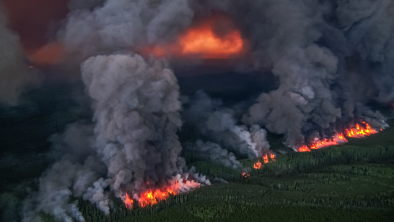In the aftermath of the wildfires, do not trust the logging companies
The Georgia Straight

In 2005, New Orleans was hit by Hurricane Katrina, causing a mass evacuation and unimaginable damage to communities. But what was brewing in the wake of the original shock was something just as damaging as the hurricane itself, and we should all be aware of it.
Corporations moved in while communities were reeling from disaster and began privatizing schools, public housing, and hospitals. These public services relied on by everyone, but especially marginalized people, were turned into for-profit businesses.
This phenomenon is called "disaster capitalism"—the privatization of public goods and services following disaster—a term coined by author Naomi Klein in her 2007 book, The Shock Doctrine.
The combination of late-stage capitalism, the COVID-19 pandemic, and climate change-driven disasters makes for perfect conditions for disaster capitalists. If past examples tell us anything, 2021 could be a year where corporate interests assume immense control of public goods and spaces due to the opportunity presented by disaster capitalism.
But this only works if people aren’t paying attention.
Forest fires are raging throughout B.C., razing entire towns and filling others with smoke, all while a fourth wave of Covid-19 continues to build. We are in a state of shock. But we must remain vigilant and prepared for what corporations here might be grasping for: the last of the high-value intact ancient forests.
Demand for lumber since COVID-19 has spiked, causing a price increase. After a hundred years of industrial forestry, the mountain pine beetle epidemic, and record wildfire seasons (the latter two both exacerbated by climate change), timber supply is dwindling. Low supply further drives up the price of lumber.
The current political landscape is changing; 2020 saw the largest movement to protect old-growth forest since B.C.'s War in the Woods protest at Clayoquot Sound in 1993. Measure all this against the plummeting social licence for old-growth logging, and it’s reasonable to assume logging corporations are eager to cut the remaining old trees while they still can.
Corporations are calculating. After such disasters, their spokespeople and marketers will try to convince communities they’re here to save the day. They’ll offer jobs, economic stimulation, and salvage logging to help ecosystems recover. We shouldn’t trust them.
Logging corporations are liquidating forests in B.C. and investing the profits in new mills in the U.S. West Fraser Timber, for example, is expanding five mills in the U.S. while closing one in Chasm, B.C., west of Kamloops.
Six other mills, owned by companies that have posted profits, have also closed in recent years. Tolko industries closed their Kelowna mill but opened a new mill in Louisiana. CANFOR is boasting of record profits yet has closed two mills in B.C. in the past two years.
Corporations insist their main goal is to employ communities but they are forced to lay people off when forests are protected.
This is a lie.
Analysis by the Truck Loggers Association states that 65 per cent of jobs lost in B.C.’s forest sector from 2000 to 2015 were due to increased productivity from automation and mechanization. In comparison, wilderness protection accounts for less than 10 percent of lost jobs.
Replacing human labour costs with technology is one of the easiest ways for corporations to maximize profit. Logging companies call themselves job creators while they automate labour at every opportunity.
If we let them, logging corporations will soon liquidate the old and highly profitable forests in B.C. Afterward, they’ll abandon communities that once depended entirely on them. As respect for Indigenous rights and title and awareness of the biodiversity and climate crises grows, many corporations are eyeing the door. The short-term jobs they might supply in the meantime aren’t worth it when layoffs are only being delayed by a few years, not avoided.
The choice we have is whether we protect what remains of old forests now or lose them forever.
Logging corporations will tell us salvage logging after fires is required for forest health. However, recent investigations show that some are targeting intact forests with unburned trees under the guise of salvage logging.
In Prince George, for example, 70 percent of spruce-beetle stands set for salvage logging contained less than 10 percent of beetle infestation. They were harvesting live trees and calling them dead beetle-infested stands. These corporations simply cannot be trusted to make decisions based on ecosystem health because profit is always their priority.
I grieve with communities hit by the toll of pandemic and then by another devastating wildfire season that we’re still in the midst of. I mourn the creatures that are running from fires only to run into another. In all this tragedy, I understand the wearout that follows.
But this is a pivotal moment. We need to be acutely aware and actively engaged. We must remind the government that its job is to protect the public, not big corporations and big money.
Most logging companies are thriving despite forests being up in flames, species going extinct, and people losing jobs to pandemics and houses to flames.
Disaster capitalists can see the bases are loaded in B.C.—there’s not going to be a better time to liquidate old forests here. But communities are resilient, and the will to fight to protect our planet is one of the most powerful emotions one can feel.
If corporations are going to try to go for a resource rush after the shock of so much devastation, they better be ready for a battle.
The Georgia Straight originally published this article.


